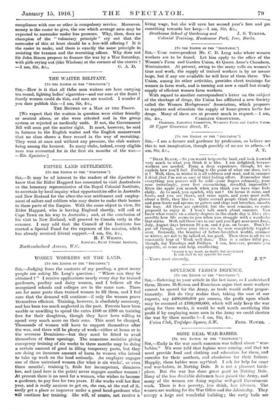WOMEN WORKERS ON THE LAND.
[To THE EDITOR OF THE " SPECTATOR:1 SIR,—Judging from the contents of my postbag, a great many people are asking Mr. Leng's question : "Where can they be obtained ? " I receive applications nearly every day for trained gardeners, poultry and dairy women, and I believe all the recognized schools and colleges are in the same case. There are far more posts than trained women to fill them, and I feel sure that the demand will continue—if only the women prove themselves efficient. Training, however, is absolutely necessary, and has been too much neglected in the past. Parents have been unable or unwilling to spend the extra £100 or £200 on training fees for their daughters, though they have been willing to spend very much more on their sons. This must be changed. Thousands of women will have to support themselves after the war, and there will be plenty of work--either at home or in the overseas Dominions—but they must be fitted to avail themselves of these openings. The numerous societies giving emergency training of six weeks to three months may be doing a certain amount of good in filling temporary posts, but they are doing an immense amount of harm to women who intend to take up work on the land seriously. An employer engages one of these untrained women (for what is six weeks', or even three months', training ?), finds her incompetent, dismisses her, and (and here is the point) never engages another woman ! At present there is no need for a woman, who wishes to become a gardener, to pay fees for two years. If she works well her first year, and is really anxious to get on, she can, at the end of it, easily get a place as improver under a good head-gardener who will continue her training. She will, of course, not receive a
living wage, but she will save her second year's fees and get something towards her keep.—I am, Sir, &c.,


































 Previous page
Previous page